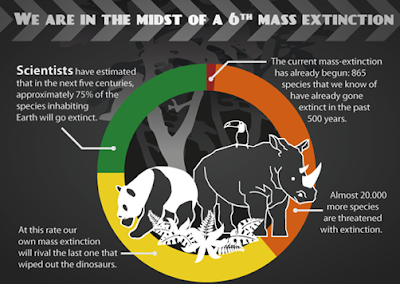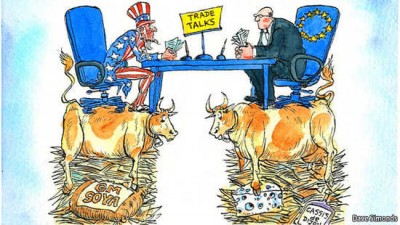
A biological crisis is a brutal and massive
disappearance of a large population of species because of too rapid a modification
of the environment. During the Cretaceous period, 65 billion years ago, one
such massive extinction occurred. We still don't really know why it happened: theories
about its causes are very controversial, but most of the species of the Earth disappeared,
among others, the T-Rex and the diplodocus. But it was only the latest of the biological
crises that the Earth has undergone; there were four major crises before that
one.
Since the 15th century, between 17,000 and 100,000
species have disappeared each year. The rate of species extinction is now higher
than ever. Because of this, scientists think we have entered a new period of
biological crisis. This is what we call the sixth biological crisis of the
Earth. But, the fact is that natural events (like meteorites, volcanoes or
glaciation) haven't caused this new crisis. It's happening because all the
environments of the planet are undergoing human impact. It destroys ecosystems
and makes species move to new places. If, in an ecosystem, there is a change,
it has repercussions on the whole of the ecosystem. Furthermore, human beings
use places for the exploitation of only one species (for example cows), to the
detriment of specific ecosystems and species. The biodiversity we observe today
is the result of 3,5 billion years of evolution and presents a wealth never
known so far. It is being seriously threatened by one species: ourselves…
We live in these ecosystems, so that's why we
need to preserve them and the species which live in them. But we tolerate irresponsible
behaviour. One example among so many: a hunter won't hesitate to kill a lion,
just for the “prestige” value.
Our behaviour is blind. We live in this world.
Earth has a unique biodiversity. Do we really want it to change? Do we really
want our children not to be able to see the incredible animals we still have?
Links:
Juliette RASCALOU will become a biologist.





